We managed to save even more money than we expected while teaching English for a year in South Korea. And guess what? You can too if you follow these tips…
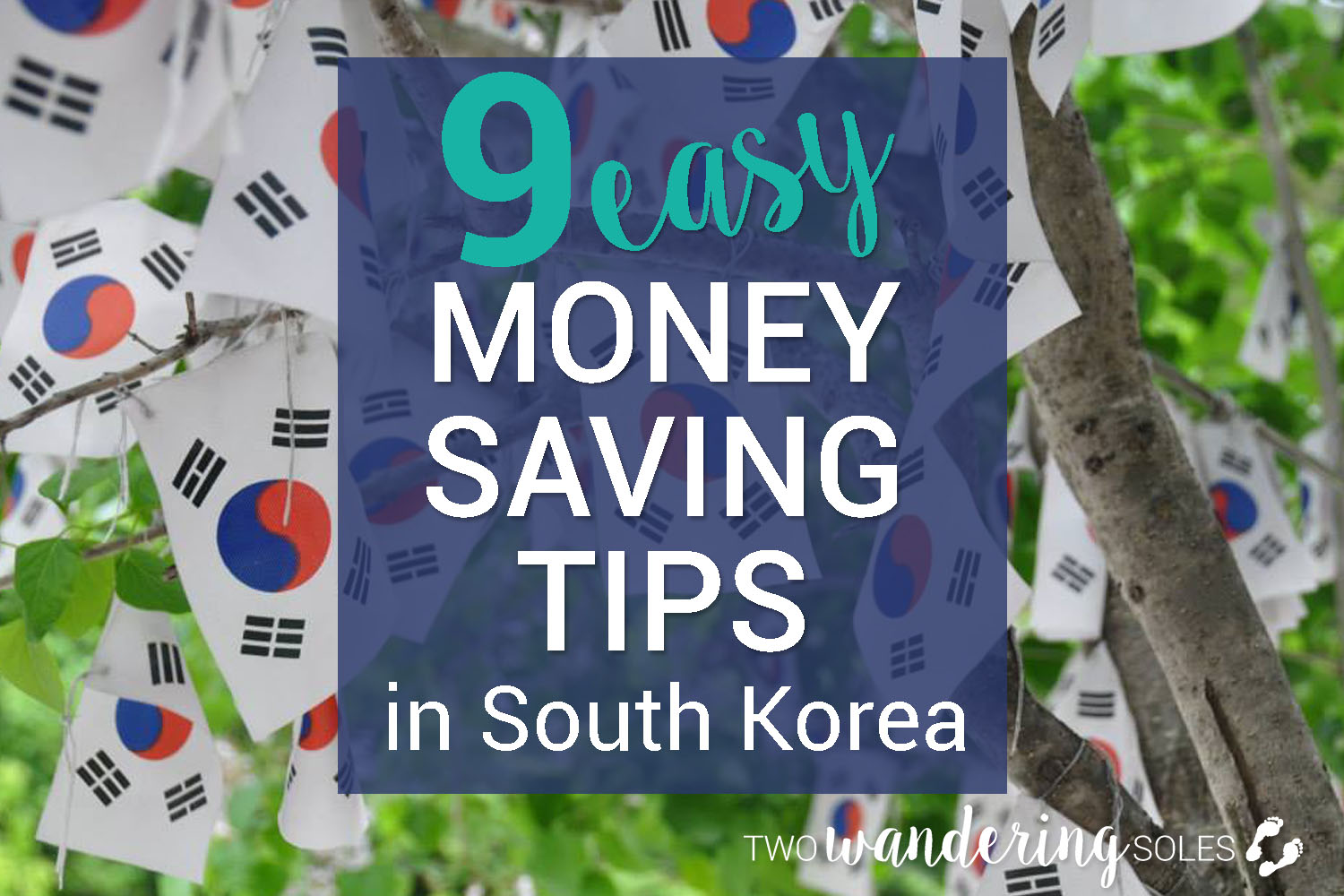
Okay, so now you know just how much money you can earn teaching English in South Korea. Is your head spinning?! Don’t worry… we are about to share with you some of the tips and tricks that helped us save more than $22,000 in one year. You can adapt them to work for you, and start watching your savings accrue.
But before we start talking budgets, I want to emphasize that saving money should never mean sacrificing your happiness. Being away from family and friends can take a toll, and it’s important to focus on the things that bring you joy.
Don’t feel guilty for little splurges here and there – we certainly had our fair share. Furthermore, be sure to experience life abroad to its fullest. Don’t let your budget hold you back when it comes to trying new things.
Did you know South Korea is a great place to teach English? Find out how to get certified to teach English abroad.

We want to make it known that while we did save a lot of money, we never felt like we missed out on any experiences because of money. We had nights out with friends, traveled a ton within Korea and Asia, ate amazing food, and enjoyed the occasional splurges like new clothes or fancy coffees. We managed to save even more than we expected. And guess what? You can too!
Whether you’re saving for future travels, to pay off student loans, to build up a “nest” for the future, or all of the above (like us!), the tips below can help you start reaching your financial goals.
NOTE: Before reading these tips, be sure to check out our blog post in which we share exactly how much you can expect to earn and save as an EPIK English teacher in South Korea.
FREE e-Book
We Traveled the World for 4 years on a Budget with these 21 Brilliant Travel Hacks!
[30 pages, money-saving trips, and 100% FREE]
Get your copy NOW!
1. Come with a plan
Do your research before you arrive in Korea. Get an idea of your income and necessary expenses, and come up with a realistic goal of how much you want to save. Feel free to use this post as a guide for your year. I bet if you really try, you can save $22,000 too! Heck, challenge yourself to save even more than we did!
Once you have an idea of how much you want to leave Korea with, come up with a monthly spending plan. How much “fun money” can you spend each paycheck in order to meet your goal? Try your best to “cut yourself off” after you’ve spend your monthly allowance. But as I mentioned earlier, don’t let your budget compromise your happiness. If you go over this month, that’s fine! Just try to spend even less next month. Soon, it’ll all even out.
Tip #1: Keep in mind that many of the payments you’ll receive (severance, pension, return flight allowance) won’t come until the end of the year. For this reason, the first few months can be a bit harder to save money, but don’t let that discourage you.
Tip #2: When planning your budget, remember to include any bills (student loans, etc.) that you have at home.

Update: Teaching during the day is not the only thing you can do to make money. One super easy way Ben has recently found is to teach English in an online classroom with VIPKID. You can earn anywhere between $16-$22 per hour (plus additional incentives) practicing English elementary-age students in China.
You can set your own schedule (best hours are Beijing evening time), work as many hours as you want and you don’t even need to your TEFL to do it. All you really have to do is be on time, be energetic and be happy, which many of you already are. Check out it VIPKID here, it will be the easiest money you make online.
2. Prioritize your spending
Answer this question: What is really important to you? Partying? Seeing the latest blockbusters in the theater? Having a cute apartment? Chose 1 or 2 of the things that are most important to you and make them your top spending priorities. If you’re a big foodie, save up and splurge on a nice meal each week. If you follow the latest fashion trends, set aside your money for a fall shopping spree.
Our main priority was travel, so we saved money specifically for this purpose. While living overseas, we visited the Philippines, Japan, Indonesia, and of course all around Korea!

Although travel was our main priority, we spent money in other ways too. We had nights out on the town with friends, ate lots of amazing food, and truly didn’t ever feel like we missed out on anything because of money.
The trick for us was moderation. We went out to the bars, but not every weekend night. We ate out sometimes, but usually cooked meals ourselves.
Once you know your top spending priorities, the next step is to figure out what you can bear to be without.
For us, it was shopping. In the entire year, we spent less than $300 on new clothes between the two of us. And all the clothes we did buy were more or less necessity (We didn’t bring nearly enough winter clothes… eek! Wish we would have had a packing list to consult before moving!).
And we walked past the isles of cute knick-knacks at the stores, so unlike many of our friends’ apartments, our place wasn’t very homey. That just wasn’t very important to us.
If you’re planning on staying in Korea for longer than a year, making your apartment feel like home may be a higher priority than it was for us. Maybe you don’t care as much about traveling. Or perhaps you don’t frequent the bars (or wine isle).
Your budget will look much different than ours. And that’s okay. Everyone’s priorities are different. Find yours.
If you’re considering teaching overseas, you MUST read this. Most bloggers and TEFL providers don’t like talk about these 13 things, because they’re not fun to hear.
3. Avoid temptation
Although the cost of living in South Korea is relatively cheap, spending money is easier than you think.
With coffee shops on every corner selling fancy iced-mocha-chino-frappes (or whatever you call ’em) for $6 USD, and makeup stores displaying every shade of nail polish known to man, temptation is all around in Korea. Literally everywhere you look.
Temptation can even be found in the comfort of your own home. Online shopping is incredibly simple, and shipping is scary fast. With a few clicks of your mouse, you can easily spend a quarter of your paycheck and your bounty will arrive in 2 days time.
Set limits for yourself. It’s not realistic to say you’ll never ever buy a coffee drink in Korea, but limit yourself to 1 a week, or 2 a month. That way you won’t feel like you’re missing out. Same goes for clothing, makeup, electronics, PC Rooms – whatever your poison may be. Ours was bingsu… And we only allowed ourselves one per month. Well, moooost of the time. When mango season rolled around, we were in for some trouble…

Tip: Set aside a certain amount of money you’re okay spending on things that aren’t necessities. When that money is gone each month, cut yourself off.
And if you know that you’re easily persuaded, avoid temptation altogether. Don’t browse the clothing in the subway stations. Stay away from coffee shops unless you’re meeting a friend. Don’t bookmark GMarket on your computer. But really, it’s dangerous… especially during desk-warming time.
4. Learn how to cook
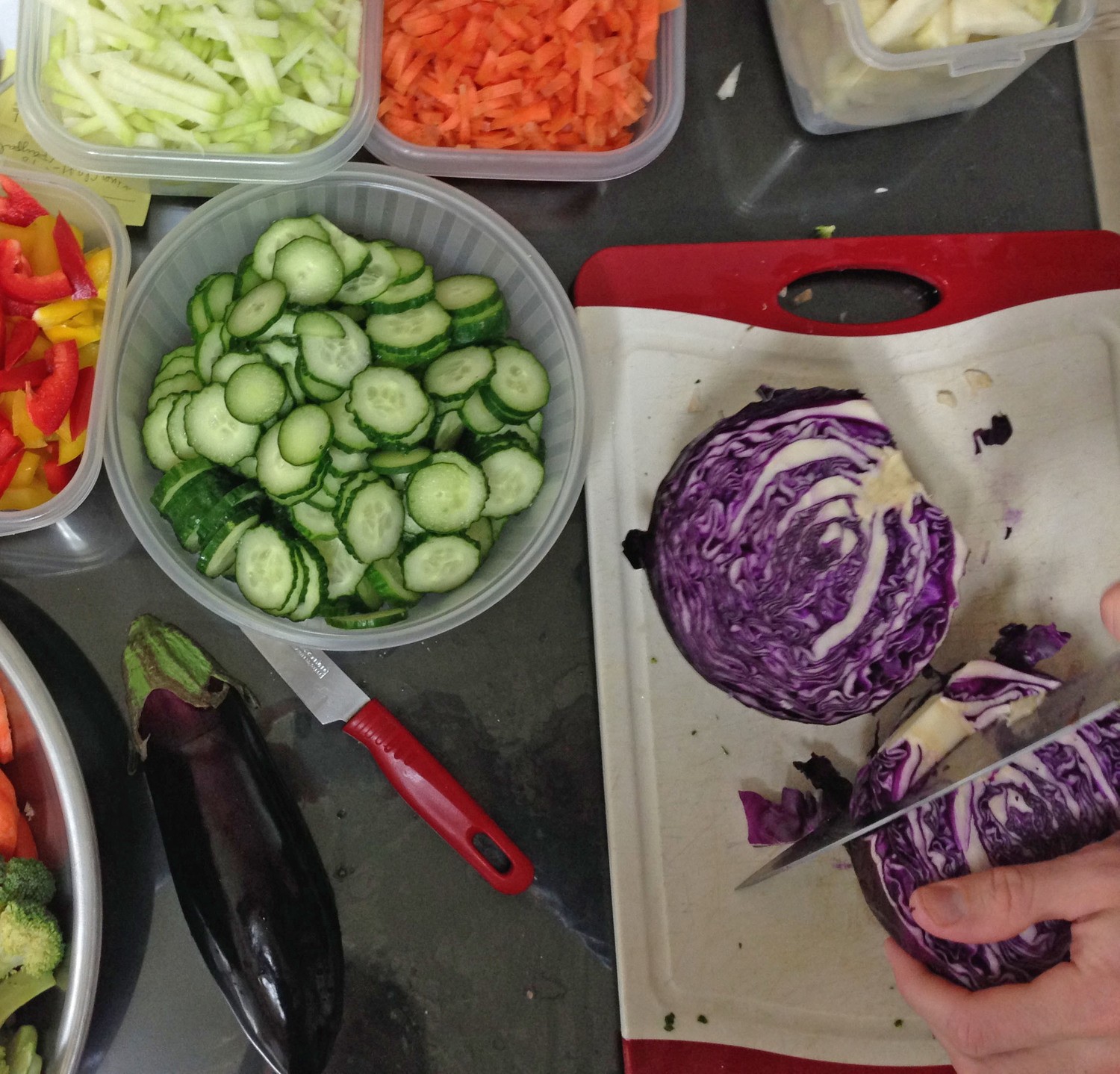
This is imperative for saving money in Korea. Everywhere you go, you’ll be surrounded by delicious (and some not so delicious) smells, luring you in. Restaurants are not hard to find, and it can be tempting to eat out several times a week. But beware: it adds up quickly! Fight the urge and cook most dinners yourself.
Our advice is to find a local grocery store with good prices. Shop a few near your apartment to compare prices, and be loyal to the one with the best deals. You’ll likely have to shop at a big mart (Home Plus, e-Mart, or Lotte Mart) for some of your groceries and other necessities (ie. wine!). But try to avoid these big stores when it comes to produce, as the prices are typically much higher than the local marts.
Shop the fruits and veggies that are in season. Korea has a big focus on locally grown produce, and typically you’ll only find what’s in season at the smaller marts. Things that are out of season can usually only be found at the big guys (ie. Home Plus, e-Mart, Lotte Mart) since they must be imported, and will cost you much more.
Splurge every now and then on an avocado, but since they aren’t grown in Korea and are quite expensive, it’s best to leave them out of your typical grocery list (if you can resist!).
To give you an idea of how much you’ll be spending: We averaged 87,500 won (about $78 USD) per week on groceries for 2 people. That makes it 43,750 won per person (about $39 USD) on groceries each week. We typically cooked our own meals at least 5-6 nights a week (as well as all of our breakfasts). And there were many weeks that we didn’t go out to eat at all.
Tip: We usually bought all of our produce on Sunday and cooked a big meal to last the rest of the week. That way we didn’t have to cook dinner after work, so we weren’t as tempted to eat out. We typically limited ourselves to eating out only on the weekends (except for special occasions).
5. Work with what you’ve got
Once you arrive in Korea you will get a rent-free apartment. The first thing you’ll want to do is fill it with stuff. Resist the urge to decorate and remind yourself that this is a temporary home. The previous teacher will most likely have left enough for you to get by for the first few weeks or months.
If someone gives you a free set of dishes, use them! Sure, they’re mismatched, but are you really planning on having regular dinner parties in your 8-by-8 apartment? And even if you do, they probably won’t be the kind that require china with matching patterns.
Our blender needed a knife to be stuck into it to turn on, and our duvet was a hue very similar to Pepto Bismol. Not things that we would have chosen at home, but when we knew we’d be ditching it in a year, we made an effort to make it work.
Sure, you can sell some of your bigger items when you leave Korea, but you likely won’t get much money back. Don’t purchase big items on the assumption that you’ll get lots of money for them at the end of your contract.
Note: Going back to priorities (#2)… If Korea will be home for a long time and having a cozy apartment is priority numero uno, ignore this tip altogether.

Tip: Reach out to Facebook groups (most larger cities have a group where people post things that are for sale). Many times, people sell things when they leave, and are willing to part with them for really low prices. And Daiso, Korea’s answer to the dollar store, will have everything you could possibly want for your new apartment at the best deals around!
6. Have fun for free (or almost free)
While there’s a lot you can spend your money on in Korea, there’s a ton to do for free as well. Here’s a few of our favorite affordable activities:
–Camping in Korea is not like it is in North America, or really and other part of the world for that matter. You won’t have your own site, surrounded by trees and equipped with a fire grate. Nope, you’ll just plop down your tent in the middle of an open space… which means it’s free! Bring your own food, beers and some folding chairs, and you’re in for a good time!
Tip: Find camping supplies on sale at the big marts in the fall. We got a 2-person tent for under $10 USD.
-Hiking is perhaps even more popular than camping, and is many Koreans’ favorite pastime. You’ll find trails, big and small, around every corner in this country. Seriously. We found a rarely occupied path just a few blocks from our apartment that we hiked just about every week in the fall and spring.
Find your own “secret hiking spot” and pack a picnic of kimbap (usually around $3 USD for a roll) for an inexpensive afternoon. For an extra reward, bring a hammock and a bottle of wine (find cheap bottles at Home Plus!) to be opened at the top!
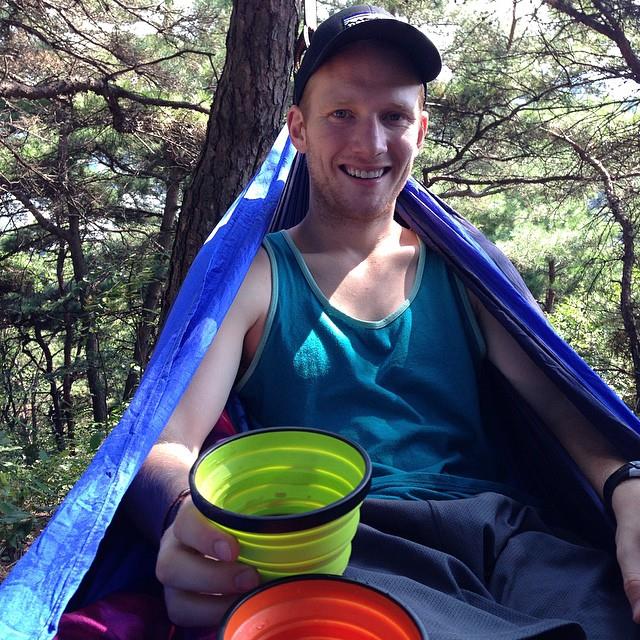
-It seems that there are festivals for just about everything in the ROK – from ice fishing to cherry blossoms, you’ll find celebrations that take place during every season. Many festivals are free to enter and are a great way to experience Korean culture on a budget. Check out the calendar of upcoming festivals on the Korean Tourism website. One of our favorite festivals in South Korea was the Andong Mask Dance which takes place in September.
-If you like staying active, join a sports league. There are groups of foreigners and/or Koreans in just about all of the larger cities that gather weekly for pick-up games of Ultimate frisbee, soccer, and even Gaelic football! Some groups just meet up for fun and there’s no cost to join, while the more competitive leagues require a fee to participate (though it’s usually much less than a gym membership).
–Board Game cafes are a great way to spend the afternoon with friends for a small fee. The hardest part is choosing from the huge selection of games to play!
–Be sure to attend a few sporting events while in Korea – they are quite the experience! Going to a baseball game is a great way to spend the day or evening and should only set you back $5-10 USD for the ticket (depending on where you sit).
One of the best parts is that you’re allowed to bring your own food and drinks! You can either pack food from home or buy a box of fried chicken for an affordable 5,000 won from one of the many vendors outside of the stadium.
Tip: Find out what sport your city is known for, and become a fan! We loved going to the professional volleyball games in our town.

Other money-saving tips:
–Travel to other cities where you have friends living. This way, you have your own “tour guide” who can show you the best spots, and you won’t have to pay for accommodation!
–Have a couple beers at 7-Eleven before going to the bars where you’ll pay double. Yes, this really is a thing.
–DVD bongs (private room to watch movies in) are plentiful and cheaper than the theaters.
-Switch it up and have a potluck dinner with friends instead of eating out.
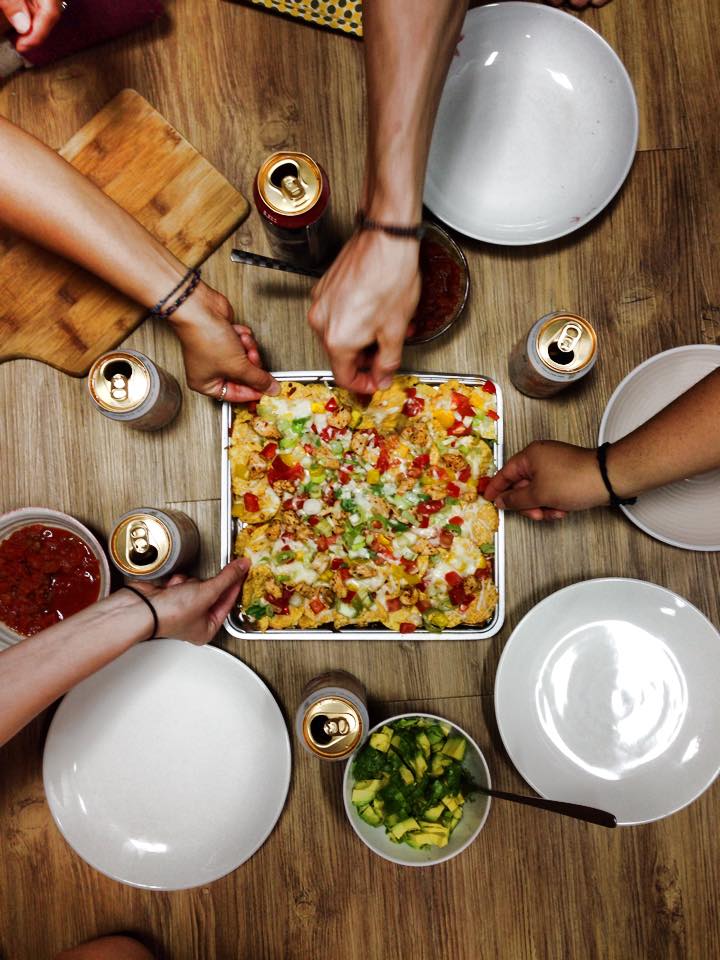
7. Become tax exempt
Here’s something that we didn’t know until a week before we boarded the plane to South Korea:
Most countries do not require you to pay income tax on your earnings in Korea during your first 2 years of teaching English. Sorry Canadian and Irish friends, you aren’t eligible for this!
BUT in order to be exempt, you must file the correct paperwork before you arrive in Korea. Save yourself from being taxed twice, and read up on the procedures.
As US citizens, we were required to fill out form 8802 (instructions here) and pay a non-refundable fee of $85. (Totally worth it in the end because it’ll save you much more!) We had to send in everything to the IRS, and wait for them to process it. Do yourself a favor and look into it early! (We almost missed the deadline.)
8. Transfer money home only when necessary
If at all possible, make your money transfers home as infrequent as possible. Each time you wire money, you will be charged a fee from your bank in Korea as well as your bank at home. (We were charged roughly $20 each time we transferred money.) But the bigger issue is that you will have little control over the exchange rate if you transfer money frequently.
If you transfer money each month without looking at the exchange rate, you are almost guaranteed to lose a few hundred (or more) dollars over the course of a year. We only transferred money home 6 times during our time in Korea. This allowed us to keep our eyes on the exchange rates and send money when the rate was best.
But I know, I know… sometimes there are bills at home that need to be paid NOW. Definitely keep on top of those. But try to build up enough money in your home account that you can go a few paychecks without making a transfer. It may take a few months, but it’ll be worth it in the end.
9. Keep track of your spending (all of it!)
People are often surprised by all the little things that add up in the end. If you don’t keep track of the 10,000 won here and 4,000 there, a good chunk of your paycheck will magically disappear without you realizing it. And it will continue to add up, month after month.
When we moved to South Korea, we started keeping track of all our spending and we saw something change. We noticed all the little things we bought for insignificant amounts of money actually added up to be quite expensive at the end of the month.
Recording our spendings wasn’t easy at first, but once we got the hang of always asking for a receipt or making notes in our phones, it became a game. Each month, our goal was to spend less than the previous month. Sometimes we succeeded, and other times we failed. But each month, we knew exactly where our money was going.
Now every time I buy something, I think about whether or not I really need it. Sure it’s only $15, but if I spend that much money a few times a month on things I don’t actually need, I’m looking at more than $500 at the end of the year. Gone. Disappeared. Never coming back.
And here’s what you were waiting for…!!!
Ben is pretty swift at excel and created a spending chart that we used every day to input expenses – all 1,302 lines of transactions throughout the year. If you would like a blank copy of the spending chart, sign up for our email list and we will personally send it to you.
That’s right… we’ll send you a FREE DOWNLOAD of the very same spreadsheet we used to stay on budget and save $22,000 each during one year!
READ MORE: If you haven’t already, be sure to check out our blog post in which we share exactly how much you can expect to earn and spend as an EPIK English teacher in South Korea.
Are you planning a trip to South Korea?
We have TONS of resources on travel in South Korea and destinations throughout the country. Check out our Ultimate South Korea Travel Guide for all the answers to your most burning questions, or read some of our favorite articles below.
- Ultimate South Korea Bucketlist
- Must Try Korean Foods on Your South Korea Travels
- Unique & Fun Things to Do in Seoul
- Moving to Korea: The Ultimate Packing List
Save this article on Pinterest for later!
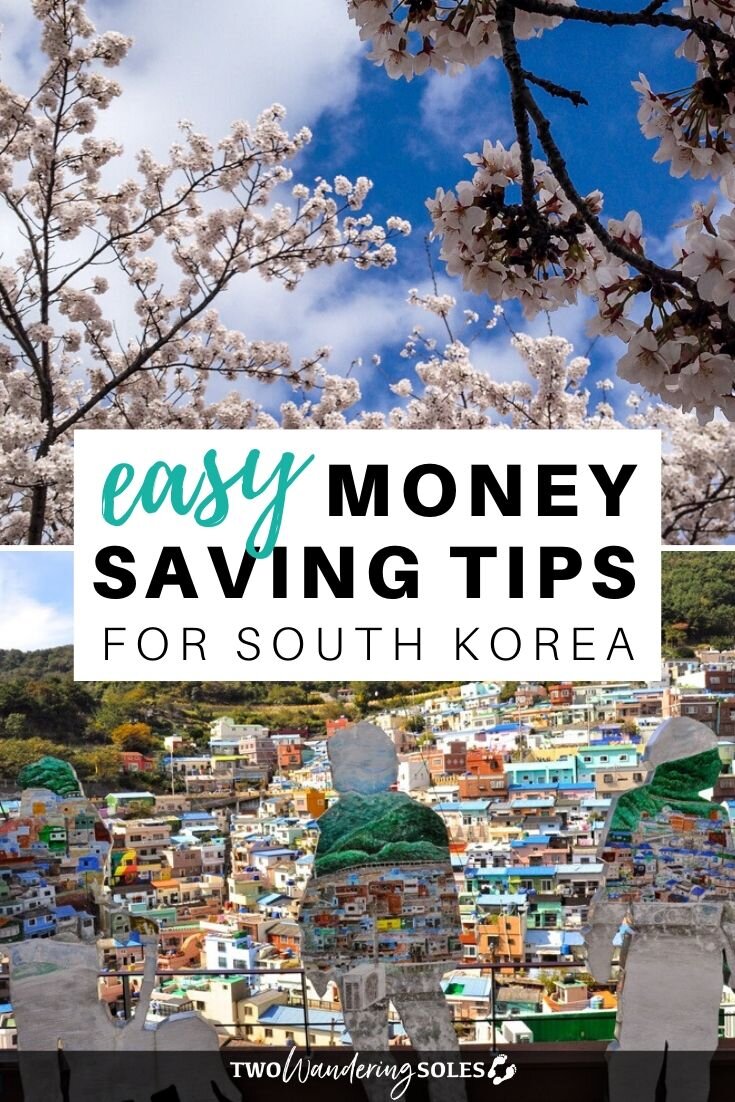
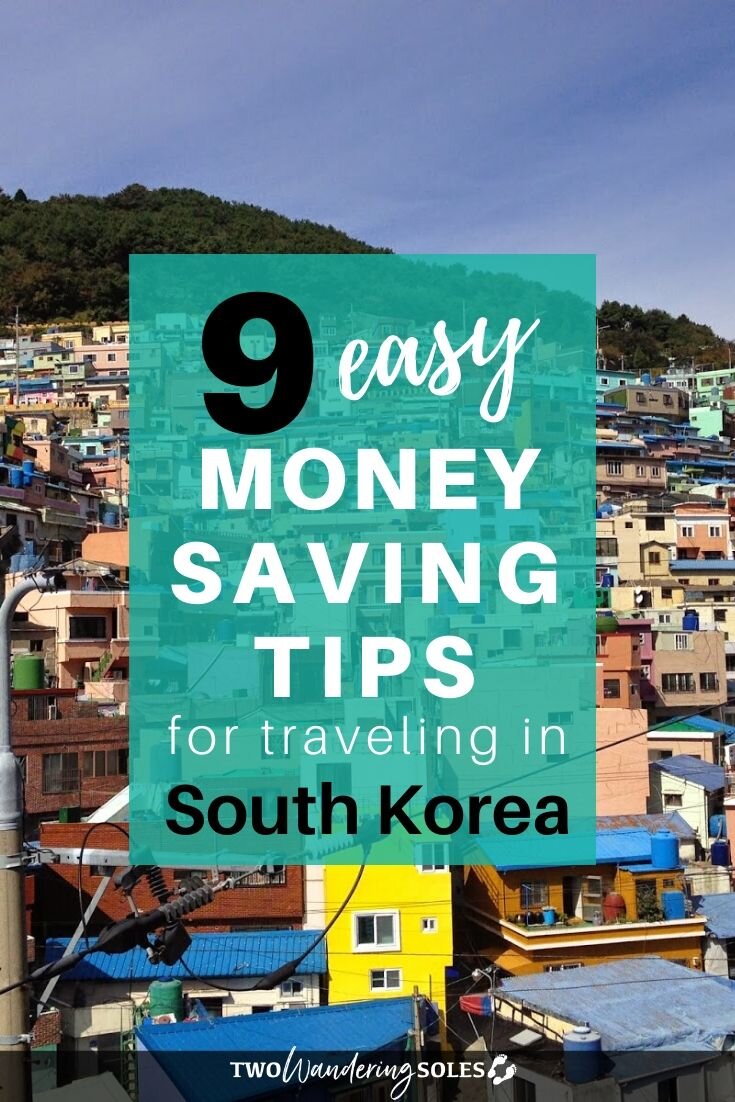
We want to hear from you!
Let us know how you budget by sharing in the comments below. How do you save money in South Korea? What tips do you have? What else do you want to know?

Katie Diederichs is the lead writer and co-founder of Two Wandering Soles, where she creates in-depth travel guides, itineraries, and tips designed to help readers plan better trips with confidence. With a background in journalism, photography, and design, she combines thorough research with firsthand experience to deliver clear, practical, and visually driven travel content. As the primary trip planner, Katie turns complex logistics into easy-to-follow advice travelers can actually use.


May have already been said but i was too lazy to read the comments. 8802 is to be exempt from Korean taxes. I think you don’t need it to be exempt from US taxes. Sorry been here for some time, read this and started freaking out about filling the 8802
Hello, I recently got offered a position at a hagwon in South Korea. I was not aware, until reading this blog, that I needed to apply to be tax exempt. For clarification purposes, I am American. I am supposed to leave for Korea in a month. Do I still have time to process that 8802? I guess essentially I am processing it only for the 2018 year right? Once I get that processed, I will receive a 6166, correct? What is a 6166 and what do I do with it once I obtain it? The instructions are very confusing and the number on the IRS website I called was not very helpful at all. So, I am hoping for some clarification by some people who have done this before.
So, I guess because I am going to be working in a private school, I am not eligible to be exempt from Korean Taxes. However, I guess I am eligible to be exempt from American taxes. I found all this info on http://www.waygook.org/index.php?topic=1237.0 it was pretty helpful.
This article is great! My partner and I have just moved to Korea a month ago. She is teaching English, I am nannying, but we can still apply these tips to our budget. Our aim is to live off of my salary and save all of hers, watch this space! Looking forward to navigating through your blog and reading some more of your Korea articles.
We have also just followed you on instagram, feel free to check us out at thekiwiwanderers ?
Thanks Toni! That’s so exciting. I have a feeling you two will love Korea. Have fun!
I wish I had read this and the other post a year ago! I’m halfway through my second year and haven’t saved anywhere near that! 22k in one year is amazing!! I done so much travel in my first year, cost a fortune but was well worth it!
Hey CJ, thanks for the comment. It took a lot of discipline and cutting back in certain areas, but it was worth it! One area that (like you!) we didn’t want to cut back on was travel. We wanted to see as much of Korea as possible and some nearby countries. While we lived in the ROK, we ended up traveling more than half the weekends around the country as well as 3 other countries! So without that travel, I think we would have saved a heck of a lot more money. Oh well! Like you said, I think travel is always worth it 😉 Best of luck on the rest of your second year! We wish we could have stayed for 2 years!
So how then did you transfer the 22K back to your american bank account?
Hey EC! We actually did a wire transfer back to our bank account at home. All you need to do is set it up at your local bank in South Korea and connect it with your bank at home. Make sure you keep an eye on the exchange rate so you get a much bang for your buck (or won, haha)!
This is great. I plan to move teach in South Korea next year! I am very, very excited for the adventure.
Have so much fun, Rachel! It is an adventure indeed 🙂
Thankyou so much the Bens’ for sharing the nine tips on saving and how you managed to save $22,000 a year as English teachers. apart from teaching, which other jobs can a non South Korean do?
We’re glad you found it helpful! South Korea is a great place to live and work. I’m not totally sure what other job opportunities there are for non-Koreans. Just about all the foreigners we knew were either in the military or were teachers (at public schools, private schools, universities, or for corporations). We did hear of a few people who moved to Korea with their companies back home and worked in international business, etc. And I am assuming that in Seoul there are a handful of foreigners working in the service industry, but I’m not exactly sure how that works with getting a work visa. Sorry we can’t be of more help! Being a teacher is by far the most common job for foreigners living in South Korea (and you don’t need any prior experience!).
Best of luck!